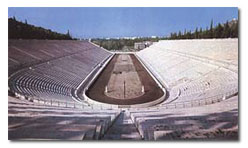
| Ceremonies | 1896 Games | Women | Interesting Facts | Sydney 2000 | Olympic Art | Morton Stadium | Dissolving Boundaries Page |
The First Modern Games in 1896
by Dena and Kerrie

The marble stadium in Athens where the first modern Olympic Games was held.
The first modern Olympics was held in Athens in Greece in 1896. The first day of the Olympics was the 25th of March. 285 athletes, all men, from 13 countries. competed in the following sports:
| Athletics
- 100m,
400m, 800m, 1500m, marathon, 110m hurdles,
hop,
step and jump, discus, long jump, putting the weight,
high jump, pole vault;
Cycling - 2km, 10km and one lap; Fencing Gymnastics - parallel bars, horizontal bars, vaulting horse, pommel horse, rings, climbing the rope; Lawn tennis; Rifle; Shooting; Weightlifting; Wrestling and Swimming - 100m, 500m, 1200m. |
The King opened the games with the words, "I declare the opening of the first International Olympic Games in Athens. Long live the Nation! Long live the Greek People!"
On the last day the prizes were presented by the King. The prizes were a branch of wild olive, a branch of laurel, diplomas and medals - silver for the first, bronze for the second.
After the prizes were awarded, the parade of the Olympic Winners took place in the stadium. The marathon winner Louis led the athletes waving a small Greek flag.
At the end of the parade, the King proclaimed in a loud voice: "I declare the First International Olympic Games terminated".
|
On the first day of the Olympics there was the 100m race, the hop, step and jump, the 800m race, throwing the discus, and the 400m race. |
The start of the 100m race |
|
Putting the weight. |
On the second day of the Olympics there was fencing, 110m hurdles, long jump, final of the 400m race, putting the weight, 1500m race and weight lifting. |
| On the third day there was shooting, lawn tennis, and cycle races. |
Pistol shooting. |
|
Parallel bars |
On the fourth day the Olympic Hymn was played. There was rifle range, lawn tennis, fencing, gymnastics, 800m final, vaulting horse and pommelled horse, rings, horizontal bars and parallel bars. |
| On the fifth day there was climbing the rope,
shooting, final of the 100m races, high jump, the
110 metre hurdles final, pole vault, marathon race and wrestling followed
by a festival in Piraeus.
|
Climbing the rope |
|
Swimming races in the sea at Pireaus |
On the sixth day there was rifle range, swimming and cycling races. |
| On the seventh day there was rifle range and marathon cycle races followed by a torch procession and a banquet at the palace. | |
| On the eighth day there were cycling races. All the other races were cancelled because the weather was too bad. | |
| On the ninth day the weather was so bad the crowning of the winners with wreaths had to be postponed. |
Spyridon Louis, a Greek shepherd, who won the marathon in 1896 in 2hours 58minutes and 50 seconds |
| On the tenth day there was the closing ceremony and all the winners were presented with their prizes by the King of Greece: an olive branch, a branch of laurel, diplomas and medals - silver for the first, bronze for the second. | |
|
Interesting Facts It took the American team 17 days to reach the games by steamer. The Italian competitor walked all the way from Milan to Athens but unfortunately he was disqualified and couldn't compete. An English tennis player, J.P. Boland, was in Athens on holiday and he decided to enter the singles tournament. He won!! Races were run clockwise and not anti-clockwise which is usual today. |
|
WWW Link: Olympics Through Time
| Ceremonies | 1896 Games | Women | Interesting Facts | Sydney 2000 | Olympic Art | Morton Stadium | Dissolving Boundaries Page |
Back to Fifth Class